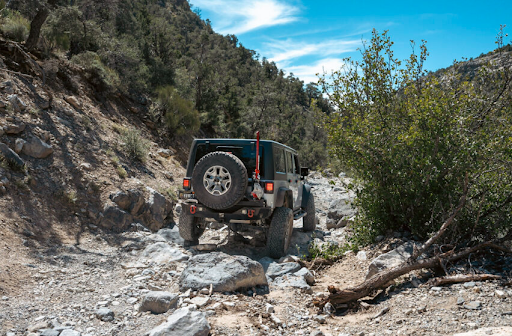Off-road enthusiasts know tires will make or break the experience. Don’t let a bad set of tires ruin your adventure. With the wide selection of off-road tires available, use this guide to determine which truck tires to purchase for an enjoyable experience.
What makes off-road tires different?
Off-road tires are manufactured to handle rocks, uneven terrain, sand, dirt, snow, and mud. As such, they’re high-performance tires. Their ability to do this is based on their tread pattern and reinforced sidewall so they’re more resistant to punctures when maneuvering around crevices and jutting rocks.
Take the TerraMax tire. It has a deep tread depth and proprietary anti-tear rubber compound extending onto the sidewall to provide real-world function with extra traction and protection when the environment demands it. It also has a squared profile and staggered, scalloped shoulder lugs with stone ejectors to maximize traction while continuously removing debris in the voids.
Types of high-performance tires
All-terrain tires
This type and snow (winter) car tires are the most widely known type of high-performance tires. All-terrain car or truck tires have strong off-roading capabilities as well as the ability to drive well on the average road, so you can go from off-roading in the country to the suburbs without changing a thing.
The best all-terrain tires work for anyone who needs both adventure and reliability in their life. All-terrain truck tires normally have an open tread design for traction, reinforced sidewalls to resist punctures, and softer rubber which can better mold to the rougher terrain.
Since these high-performance tires are normally used to drive on more uneven terrain with higher risk, they generally don’t last as long as a standard tire that would only be used driving to and from work or around the city.
Mud-terrain tires
These truck tires have wider and deeper treads to provide better traction in muddy conditions so they don’t sit in place and spin. Since you might not know what terrain the tires will be hitting in mud, these tires also have reinforced sidewalls.
However, since these tires are so adept at handling mud, they don’t do as well on regular pavement. They’ll also likely be louder the faster you drive due to the tread pattern.
Rock tires
For true daredevils and adventures, rock tires are the way to go. These truck tires can maneuver across rocky, uneven terrain without damage due to the sidewall reinforcement that supersedes that of the mud and all-terrain tires.
Snow tires
Snow or winter car tires are much more common for Canadian drivers as they’re often put on in the winter months in cities that get lots of snow. Snow tires use material that won’t harden in cold weather so they won’t lose their grip control. These car tires use special rubber to remain flexible in freezing temperatures and are excellent for the average winter driver.
Top tips for choosing the right off-road tires
You can’t pop any set of tires onto any vehicle and expect top results. There are a few factors that help determine which tires to put on your vehicle.
In the best-case scenario, the wrong tires will drain your fuel and negatively affect handling. But, realistically, using the wrong tires can damage the wheels, and the vehicle, endanger your life and others, and lead to an accident. Consider the following.
Is your vehicle type compatible with the set of tires?
There are truck tires and car tires and they shouldn’t be mixed. Truck tires are usually larger, made for larger vehicles, and carry heavier loads. Car tires are smaller and carry less weight.
What terrain will you be driving on?
If you’re only going to be driving on regular pavement and city streets, you only need all-terrain or winter tires if it’s snowy. It will better suit your vehicle, fuel use, and your budget.
If you’re planning on hitting rocky mountains, get rock tires. Muddy slopes? Get mud tires.
Don’t get a high-performance tire that isn’t going to be doing what it’s made to do. Not only will it be more expensive, but it will unnecessarily wear down the tires on the wrong terrain, and make regular driving less smooth.
What tire size does your vehicle require?
This isn’t negotiable. Vehicles will have a predetermined tire size. Using anything larger will cause problems. The tire size can be found on the sidewall. Always replace your tires with a set of the same size.
Choose all-terrain tires if you:
- Do regular driving as well as light off-roading and need to easily switch between the two.
Choose mud-terrain tires if you:
- Have another set of standard road tires and drive in wet, muddy conditions that require extra traction.
Choose rock tires if you:
- Have another set of standard road tires and need high-performance tires that can handle extremely rough terrain without the risk of damage or puncture.
Choose snow tires if you:
- Do regular driving and need extra traction and control because of winter road conditions.
Sailun for your off-road needs
There are many car tires and truck tires to choose from if you want to add off-roading to your life or if you need to replace your current set before your next expedition. Shop Sailun for tires that go from everyday driving to hardcore mountain scaling.


